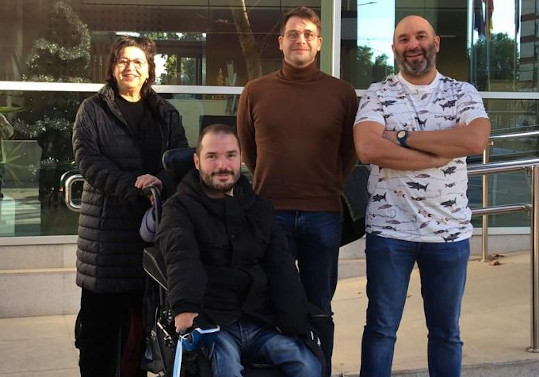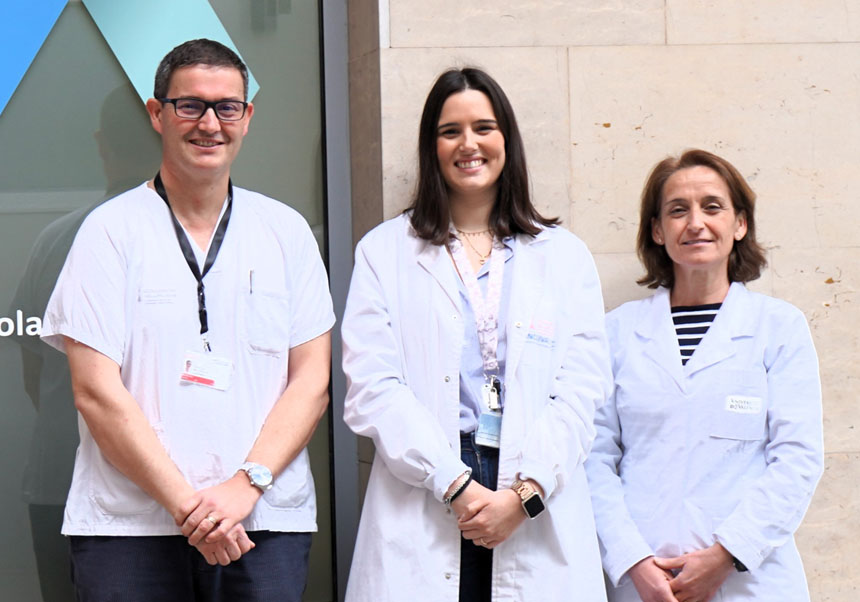The Universitat develops a safe model for self-driving cars
- Press Office
- January 26th, 2024

Project BERTHA receives €7.9M of funding from the EU in order to develop a driver behaviour model that will make self-driving vehicles safer and more similar to those driven by humans
A research group from the Universitat de València, comprised of Carmen Armero, Francisco Palmí, and Gabriel Calvo, from the Department of Statistics and Operational Research of the Universitat de València; and Virgilio Gómez Rubio, from the Department of Mathematics of the University of Castilla-La Mancha, is participating in the project BERTHA, which aims to develop a scalable and probabilistic driver behaviour model which will be key in accomplishing the development of safer self-driving vehicles with a behaviour more similar to that of humans, in this way increasing social acceptance. The group from the Universitat de València will be tasked with designing the part of the driver behaviour model, using probability calculus.
In essence, the probabilistic model will take into account the traits of drivers (such as age, sex, years of driving experience, etc.), the surroundings (weather, traffic density, etc.), and other variables that may be relevant when creating the driving model. The tool used will be Bayesian networks, since they allow for the establishment of relationships of dependence between the different variables and the determination of the response during driving depending on its characteristics. In this way, different driver profiles will be established (e.g., very aggressive or very cautious) and models will be created regarding the chances of responding in one way or another to the manoeuvres during driving. These profiles will have the chance of being incorporated into simulators, helping develop driving environments that mimic reality much more closely than the currently existing ones.
Results from the project will be available for the academia and the industry through an open-source data HUB. They will also be implemented into CARLA, an open-source self-driving simulator.
The Horizon Europa BERTHA project launched in late 2023 in Valencia and has received €7,981,799.50 from the European Commission in order to develop this driver behaviour model.
The need for a driver behaviour model in the industry of Connected, Cooperative and Automated Mobility presents important opportunities for the European Union. However, its deployment requires of new tools that allow for the design and analysis of components of autonomous vehicles, together with their digital validation and a common language between suppliers and manufacturers.
One of the main shortcomings is the lack of a validated and science-based driver behaviour model that covers the aspects of human driving performance, allowing for the understanding and testing of the interaction between connected autonomous vehicles (CAV) with other vehicles in a safer and more predictable manner from a human perspective. Thus, the currently developing model could guarantee the digital validation of autonomous vehicles’ components and, if t is incorporated into the software of ECUs (Engine Control Unit, the “brain” of a vehicle), it could generate a more human-like response in these vehicles, improving then their acceptance.
To provide for this need, the BERTHA project will develop this driver behaviour model (DBM) based mainly on Bayesian networks.
BERTHA will also develop a methodology that will share the model with the scientific community to aid its growth. In addition, its results will include a set of interlinked demonstrators to showcase the DBM approach as a reference for designing human-like, easily predictable and acceptable behaviour of automated driving functions in mixed traffic scenarios.
The BERTHA Project group is comprised of 14 partners from 6 different countries, coordinated by the Instituto de Biomecánica de València (IBV – Biomechanics Institute of Valencia). The partners of this project are the Universitat de València (ES), the Vedecom Institute (FR), Université Gustave Eiffel (FR), German Research Center for Artificial Intelligence (DE), Computer Vision Center (ES), Altran Deutschland (DE), Continental automotive France (FR), CIDAUT Foundation (ES), Austrian Institute of Technology (AT), Europcar International (FR), FI Group (PT), Panasonic automotive Systems Europe (DE) and the Korea Transporte Institute (KOTI).















